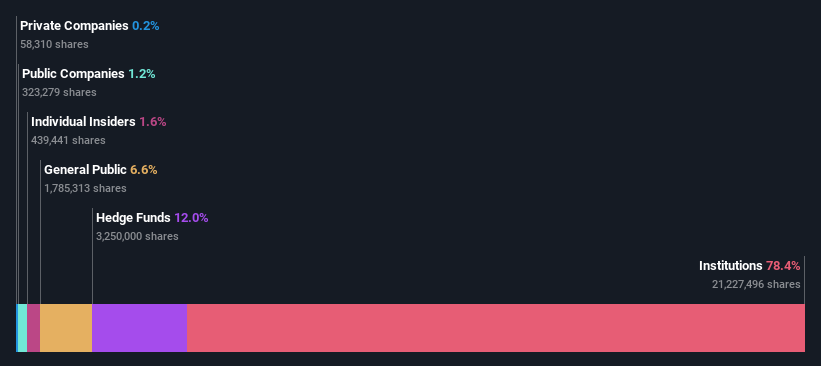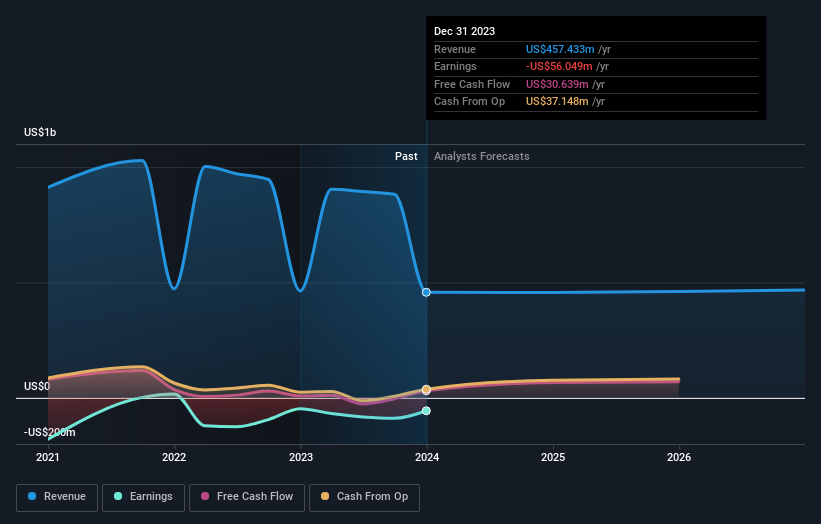Institutional investors in ZimVie Inc. (NASDAQ:ZIMV) see US$61m decrease in market cap last week, although long-term gains have benefitted them.
Key Insights
Given the large stake in the stock by institutions, ZimVie's stock price might be vulnerable to their trading decisions
The top 11 shareholders own 50% of the company
Using data from company's past performance alongside ownership research, one can better assess the future performance of a company
If you want to know who really controls ZimVie Inc. (NASDAQ:ZIMV), then you'll have to look at the makeup of its share registry. The group holding the most number of shares in the company, around 78% to be precise, is institutions. Put another way, the group faces the maximum upside potential (or downside risk).
Institutional investors endured the highest losses after the company's market cap fell by US$61m last week. However, the 210% one-year return to shareholders might have softened the blow. But they would probably be wary of future losses.
Let's take a closer look to see what the different types of shareholders can tell us about ZimVie.
View our latest analysis for ZimVie
What Does The Institutional Ownership Tell Us About ZimVie?
Institutional investors commonly compare their own returns to the returns of a commonly followed index. So they generally do consider buying larger companies that are included in the relevant benchmark index.
We can see that ZimVie does have institutional investors; and they hold a good portion of the company's stock. This implies the analysts working for those institutions have looked at the stock and they like it. But just like anyone else, they could be wrong. When multiple institutions own a stock, there's always a risk that they are in a 'crowded trade'. When such a trade goes wrong, multiple parties may compete to sell stock fast. This risk is higher in a company without a history of growth. You can see ZimVie's historic earnings and revenue below, but keep in mind there's always more to the story.
Since institutional investors own more than half the issued stock, the board will likely have to pay attention to their preferences. It looks like hedge funds own 12% of ZimVie shares. That catches my attention because hedge funds sometimes try to influence management, or bring about changes that will create near term value for shareholders. Our data shows that Camber Capital Management LP is the largest shareholder with 12% of shares outstanding. Meanwhile, the second and third largest shareholders, hold 6.7% and 6.5%, of the shares outstanding, respectively. Furthermore, CEO Vafa Jamali is the owner of 0.8% of the company's shares.
After doing some more digging, we found that the top 11 have the combined ownership of 50% in the company, suggesting that no single shareholder has significant control over the company.
While studying institutional ownership for a company can add value to your research, it is also a good practice to research analyst recommendations to get a deeper understand of a stock's expected performance. There is some analyst coverage of the stock, but it could still become more well known, with time.
Insider Ownership Of ZimVie
The definition of an insider can differ slightly between different countries, but members of the board of directors always count. Management ultimately answers to the board. However, it is not uncommon for managers to be executive board members, especially if they are a founder or the CEO.
I generally consider insider ownership to be a good thing. However, on some occasions it makes it more difficult for other shareholders to hold the board accountable for decisions.
We can report that insiders do own shares in ZimVie Inc.. It has a market capitalization of just US$464m, and insiders have US$7.5m worth of shares, in their own names. This shows at least some alignment. You can click here to see if those insiders have been buying or selling.
General Public Ownership
The general public, who are usually individual investors, hold 6.6% stake in ZimVie, which represents a relatively small class of owners. We'd generally expect to see a higher level of ownership by the general public, than this. It's not too concerning, but it is worth noting that retail investors might struggle to influence board decisions.
Next Steps:
While it is well worth considering the different groups that own a company, there are other factors that are even more important. Case in point: We've spotted 2 warning signs for ZimVie you should be aware of.
But ultimately it is the future, not the past, that will determine how well the owners of this business will do. Therefore we think it advisable to take a look at this free report showing whether analysts are predicting a brighter future.
NB: Figures in this article are calculated using data from the last twelve months, which refer to the 12-month period ending on the last date of the month the financial statement is dated. This may not be consistent with full year annual report figures.
Have feedback on this article? Concerned about the content? Get in touch with us directly. Alternatively, email editorial-team@simplywallst.com
Simply Wall St analyst Simply Wall St and Simply Wall St have no position in any of the companies mentioned. This article is general in nature. We provide commentary based on historical data and analyst forecasts only using an unbiased methodology and our articles are not intended to be financial advice. It does not constitute a recommendation to buy or sell any stock and does not take account of your objectives, or your financial situation. We aim to bring you long-term focused analysis driven by fundamental data. Note that our analysis may not factor in the latest price-sensitive company announcements or qualitative material.


